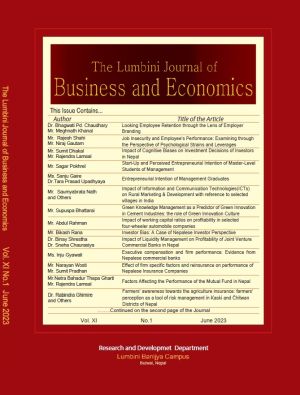Start-Up and Perceived Entrepreneurial Intention of Master-Level Students of Management
DOI:
https://doi.org/10.3126/ljbe.v11i1.54316Keywords:
entrepreneurial intent, students, reliability, future, educationAbstract
Various circumstances may influence the entrepreneurial intent of students. The likelihood that a student will engage in entrepreneurial action in the future depends on their entrepreneurial intention. The major goal of the study is to comprehend how master's level management students from Butwal Sub-Metropolitan City's entrepreneurial purpose is influenced by attitude toward behavior, subjective norms, perceived behavioral control, entrepreneurship education, and personality features. Distribution of survey questionnaires to respondents at several master's level management colleges in Butwal is how the basic data for this study was obtained. Of the 271 successful responses, 271 were considered in the analysis. Every variable is subjected to Cronbach's alpha reliability test, which ensures high-reliability results. In this study, multiple linear regression analysis and Pearson's correlation coefficient are used to analyze the observed independent variables (i.e. attitude towards behavior, subjective norms, perceived behavioral control, entrepreneurship education, and personality traits). The association between each factor and entrepreneurial intent is important. The study's findings show that most master's level management students are planning to participate in entrepreneurial projects in the future, which is positive. To raise student knowledge of career options as entrepreneurs, policymakers and academics must get involved early in the process of providing entrepreneurship education. To increase students' motivation, family, friends, and relatives must be encouraged to provide structural support.




